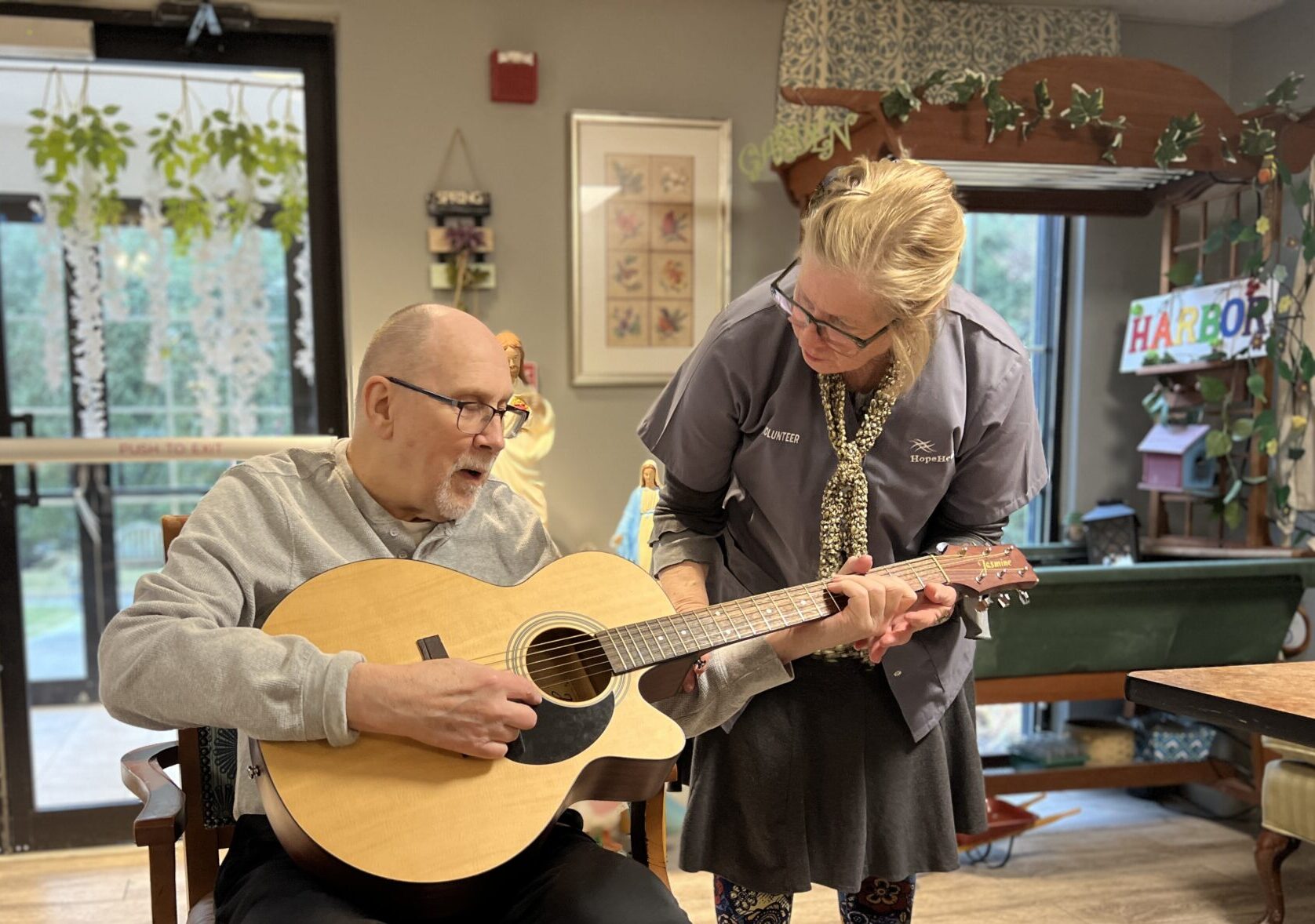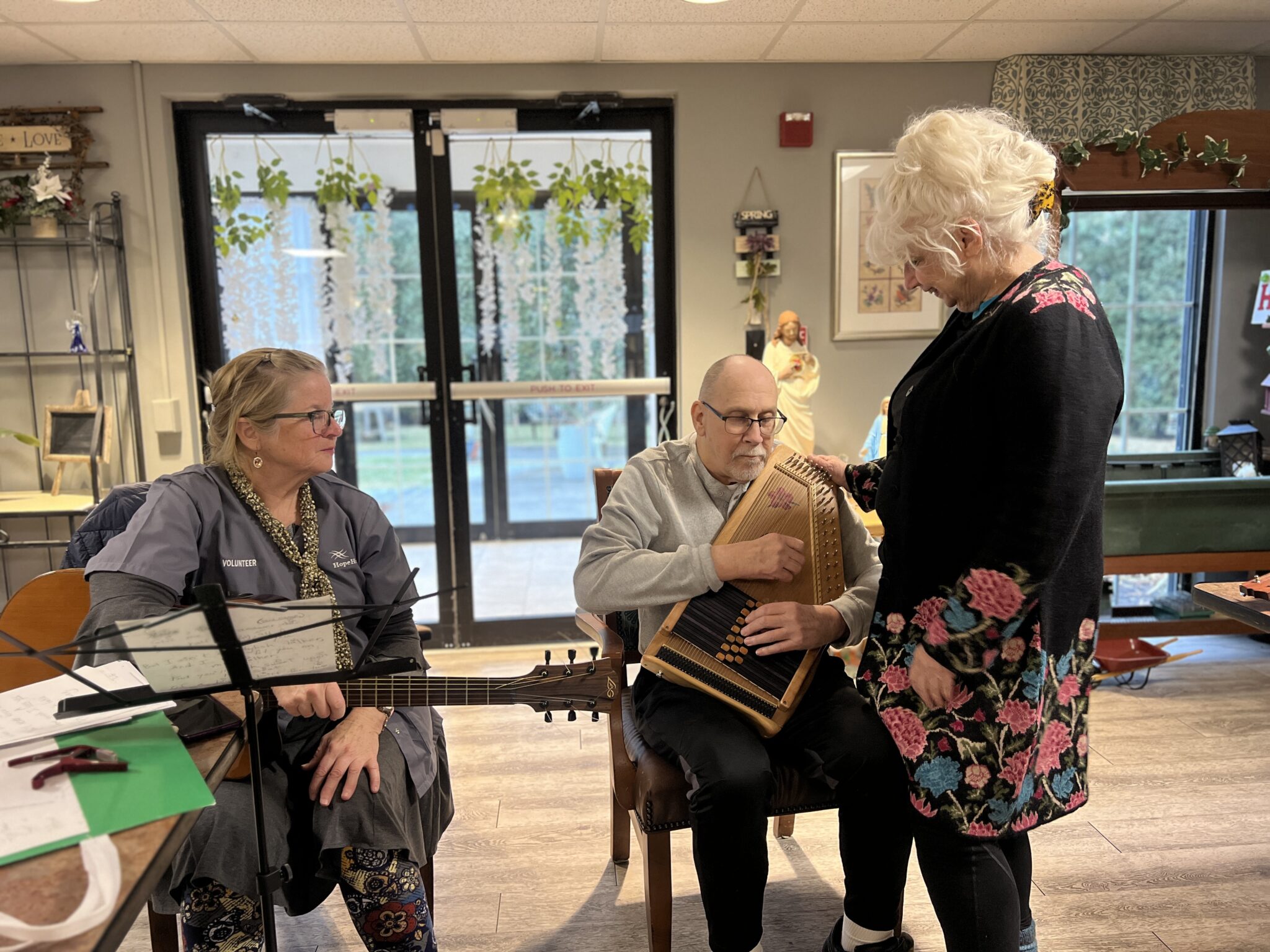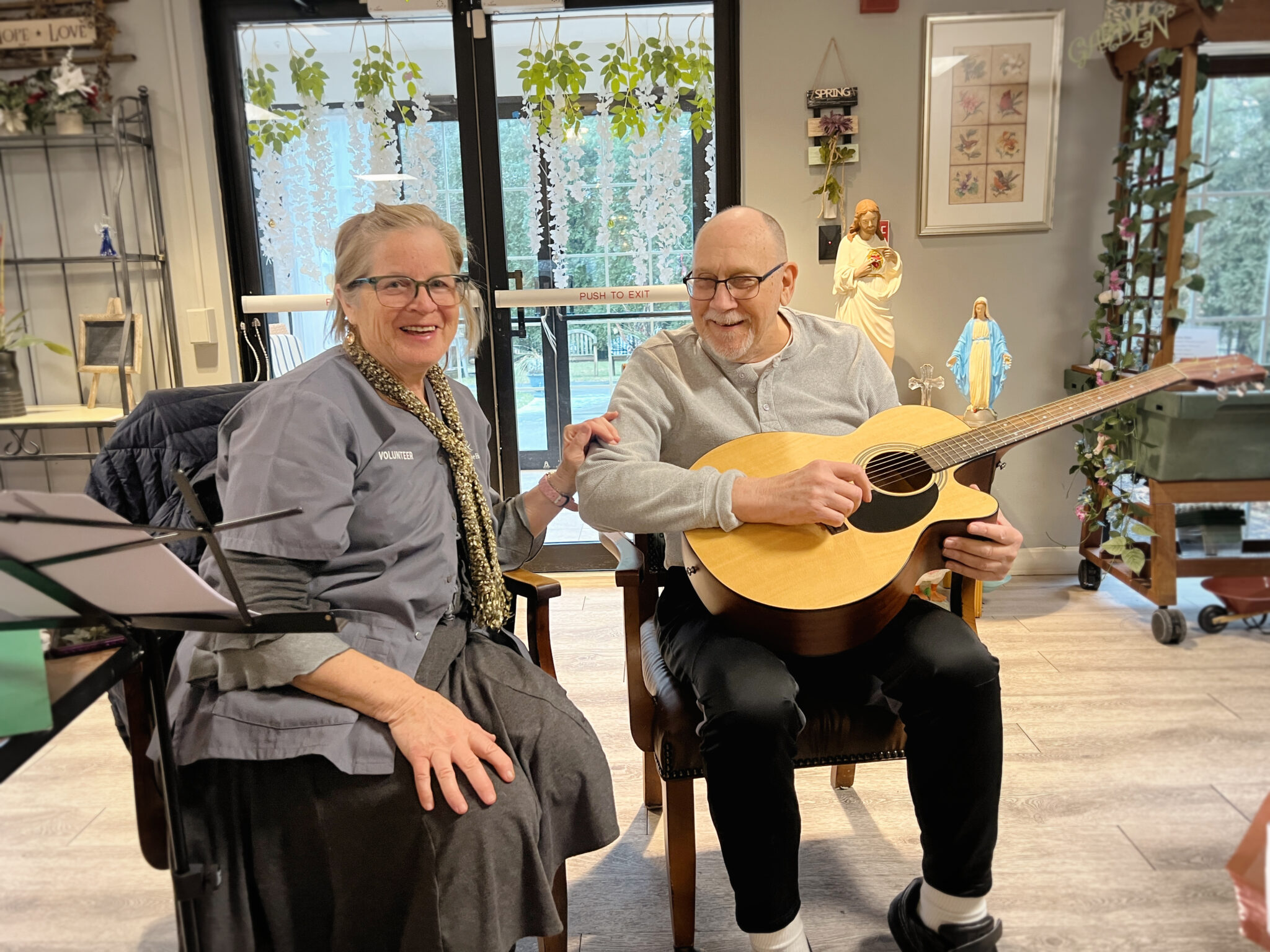When hospice volunteer Crystal Jackins first introduced herself to Richard, he couldn’t tell her his name. He wasn’t much interested in conversation. Over the past years, dementia had taken those pieces of him — eroding his words, his memories, and his ability to care for himself.
Then Richard’s wife, Jane, placed a guitar in his hands.
“Richard started playing. And I don’t mean just strumming — I mean fingerpicking every note,” says Crystal. “I was in shock. He didn’t know his own name. But he could play song after song after song.”
> Become a HopeHealth volunteer
A calling in music
That introduction to Richard, and their weekly visits since, are exactly why Crystal became a HopeHealth volunteer. The idea came to her while spending time with friends whose young child was on hospice. A music volunteer had stopped by the house to play music for the child. Crystal was so moved by the experience, she couldn’t sleep that night.
“I remember thinking and thinking about that volunteer. Knowing full well that this little boy was going to die, she was making him feel happy,” says Crystal. “I thought, I’ve got to do this. I knew it was my calling.”
A retired teacher and lifelong musician, she’s long been used to leading students in song, and even had experiencing performing at nursing homes with choral groups. Using her musical skills as a HopeHealth volunteer felt like the perfect melding of those experiences.
It’s been even more meaningful than she’d imagined. One family recently invited her into their room at the HopeHealth Hulitar Hospice Center, asking Crystal to sing with their mom as she entered her final hours.
“It’s sad, of course. But it’s also happy, because you know you’re making someone happy in their final days. You’re making their final days good,” says Crystal.
> Read: 12 music activities & tips for someone with dementia
Putting memories to music
Before meeting a patient, Crystal connects with their family to learn about their musical tastes. She carries a folder filled with songs: John Denver classics for one patient, country ballads for another, Elvis and Beatles tunes for many more. She brings religious songs like “Amazing Grace” and “The Old Rugged Cross,” and even playful standards like “How Much Is That Doggy in the Window?”
Many of the patients she visits have dementia. While the disease shows up differently for everyone, time and again, she sees one common theme: music sparks joy, and comfort, and memories.
“It’s like a miracle. How can a person not know anything around them, and then know these old songs?” Crystal says.
There’s a scientific explanation. Neuroscientists have found that rhythm, poetry and prayer are among the last memories our brains hold onto, even as dementia progresses. Music, rooted deeply in the brain’s emotional memory center, can help people reconnect to themselves and others — sparking memories, emotions, even speech.
“It really is amazing that a person who can’t remember what they ate for lunch, can’t remember where their recent field trip went, can’t remember their relative’s names, all of a sudden can sing an entire song. Every single word of it!” says Crystal.
That includes Richard. For a long time, he still played and sang dozens of songs, both on guitar and auto-harp. Recently, that number has dwindled to six or seven favorites — but his performance is joyful as ever.
Every week, when Crystal arrives at Richard’s nursing home, they set up with their guitars in a common area where other residents can join. Crystal helps Richard position his fingers on the strings. And then his muscle memory takes over. Together, they lead joyful sessions of bluegrass and folk favorites like “Red River Valley,” “You Are My Sunshine,” and Richard’s favorite, “I’ve Been Working on the Railroad.”
For about an hour, music fills the room. Residents clap, hum, and sing along. Family members tap their toes and smile. Jane is often among them, swaying to the music, soaking in the scene.
“Music is a really important part of helping people with dementia. So often they don’t interact with others. But with music, they’re humming the songs, they’re laughing, they love it,” says Jane, who volunteers at HopeHealth’s annual summer remembrance event. “Sometimes they know the songs so well, I think to myself, ‘Am I really in an Alzheimer’s unit?’ That’s quite an accomplishment, to remember songs from their childhood.”


> Read: How to plan meaningful activities for someone living with dementia
Music as a lifelong gift
As for Richard, “music is still such a big part of him,” says Jane. Every time she visits, she urges him to play.
It’s about more than entertainment — music is how he connects. From 1978 until 2015, Richard was a beloved professor of Biological Sciences at the University of Rhode Island. During those decades, he’d often tote his instruments to class to teach his enraptured students — always a packed hall — about acoustics. When he and Jane moved to a new town, he’d promptly start a neighborhood jam circle. One way or another, he’d use music to bring people together.
When Richard was diagnosed with Alzheimer’s, and he and Jane came to grips with all the changes ahead, they knew how important it was for music to remain at the center of his life. With a little help from people like Jane and Crystal, that’s absolutely true. Along the way, he’s filling his community with music too.
“Richard’s been a fantastic teacher his whole life. I think he’s continuing that, in a way, by getting all these people around him to sing and connect,” says Jane. “Music has kept him going during all of this.”

